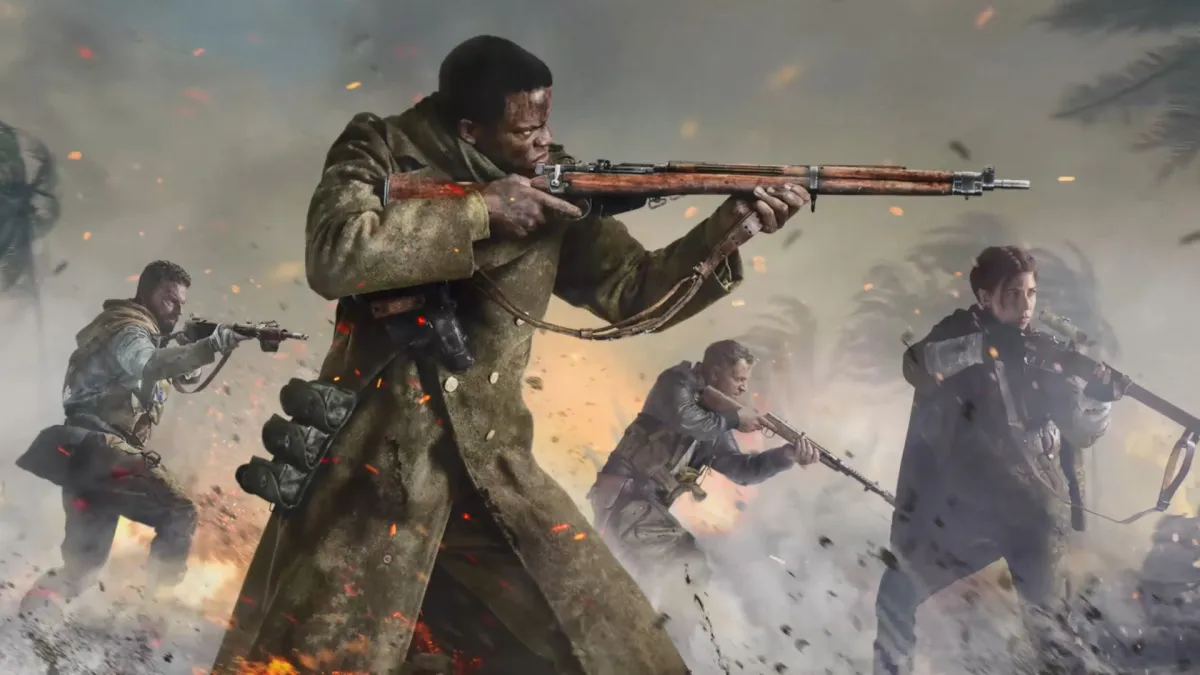Call of Duty: Vanguard on PS5
For years now, the Call of Duty series’ entries could be divided into three distinct pillars. There’s the single-player campaign, offering up a story of a personality-deprived soldier who embarks on an epic quest to save the world/ their country/ stop a really bad guy. It’s filled with explosive set-pieces that make it a memorable, albeit familiar feeling experience each year. Then you’ve got the multiplayer, Call of Duty’s bread and butter with its silky smooth, fast-paced action and bucket-loads of progression to keep you playing for hundreds of hours. Finally, there’s the ever-rotating third chair, often occupied by an offering of unloading thousands upon thousands of bullets into the undead as players try to survive as many rounds as they can. It’s a meaty collection and one that’s resonated with fans since the days of Call of Duty: World at War back in 2008. Now, 13 years later, Call of Duty: Vanguard takes us back into the World War II era with those familiar three pillars offering a mixed bag for players.
In this review, I’ll be covering everything CoD Vanguard has to offer, from the campaign through to zombies and my experiences in the multiplayer thus far. Keep in mind that balance changes and patches can adjust the gameplay in multiplayer, though, so there’s a good chance things could be improved upon further down the line.
Campaign
It only seems fitting that we start with the campaign, the more concise of the three pillars that form CoD Vanguard’s structure. This time around, players follow a special forces team called Task Force One, comprised of Arthur Kingsley, Polina Petrova, Wade Jackson, Lucas Riggs and Richard Webb. Each character is a specialist in their own right; Petrova a formidable sniper from the USSR, Wade a hot-headed maverick in the air force, and Lucas a demolitions expert from Australia. It’s not just their specialities that make these characters feel unique, though. Vanguard’s campaign spends most of its missions having you embark on missions from their past, providing you some background as to how they became part of Task Force One, what they’re fighting for, and how each one distinctly handles.
That’s something I admittedly wasn’t expecting when starting CoD Vanguard’s campaign. How well the game would make each character feel unique and relatable. The characters are well-written, even if the voice acting can feel a little shaky from some of the ensemble cast. Each character’s unique abilities like Wade’s ‘Focus’ ability that allows him to slow down time, or Polina’s agile nature allowing her to move around faster and climb up brick walls to help her get a good angle on the action with her sniper only take this further, providing minor tweaks to the gameplay to help keep things feeling fresh throughout its six hour duration.
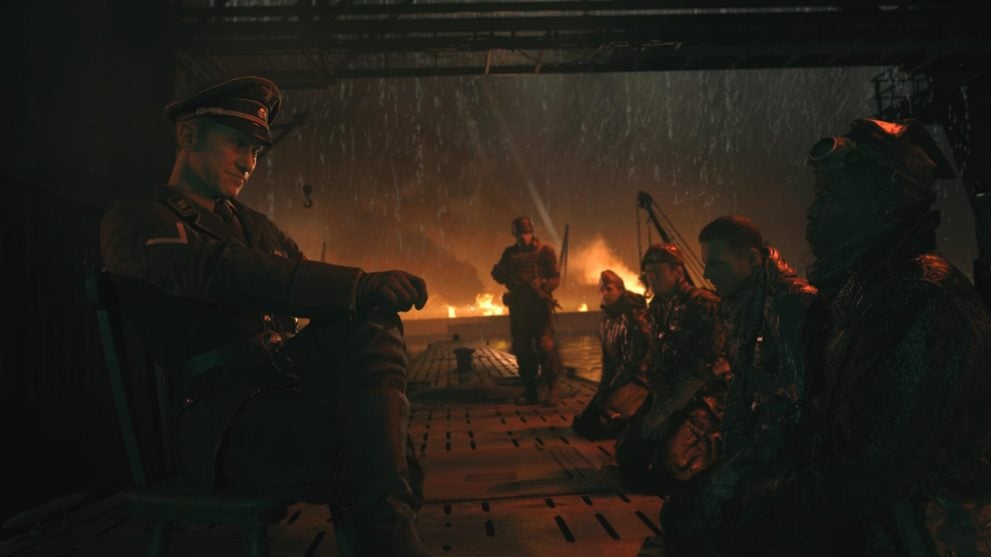
But in focusing so much on its cast, Vanguard’s campaign can often feel a little disjointed. It drags players from the USSR at one point in time for Petrova’s stealthy, sniper-based ‘Lady Nightingale’ mission — one of, if not, the best in the game — back into the ‘present’ for a few brief cutscenes, only to send you hurtling back in time with another character and back again. It’s enough to give you whiplash! Seriously, though, while I enjoyed the mission-to-mission gameplay, I did find the countless flashbacks made Vanguard’s story a little forgettable. It’s a double-edged sword, allowing the gameplay to stretch its legs, taking us to more varied locales and put us in different combat scenarios, but with the ‘present’ sections largely relegated to cutscenes outside of the first and last missions, I never felt particularly tied to the team.
Fortunately, the missions themselves are a diversified and eclectic mix of high-quality FPS action. In one mission I was creeping through the jungle trying to escape Japanese search parties while avoiding ambush points, the next I was high in the skies, dive-bombing aircraft carriers, or in the blistering cold of the USSR trying to take down the infamous Nazi Steiner as Petrova. With each mission, the pacing changes, too, ensuring there’s a little bit of something for everyone in here. Stealth sections with Petrova feel suitably tense, while running all-guns-blazing into a Nazi base in Africa as Riggs, blowing up ammo depots, tanks and fuel reserves had my screen illuminating with realistic explosions and the intermittent flashes of gunfire.
The only issue with all of this is how dumb the AI often feels. As great as I’d like to be at stealth sections, these aren’t my forte and on several occasions I bumped straight into an enemy, only for them to stand staring at me for a few seconds before trying to gun me down or alert their comrades. This gave me enough time to mash the melee button for a silent takedown before moving on. This wasn’t the only instance of poor AI and throughout the entire campaign, enemies just felt a little too dumbed down and unaware of basic military tactics like flanking. Sure, you can up the difficulty, but it feels as though Call of Duty’s AI’s in need of a serious modernization to keep up with the latest and greatest games.
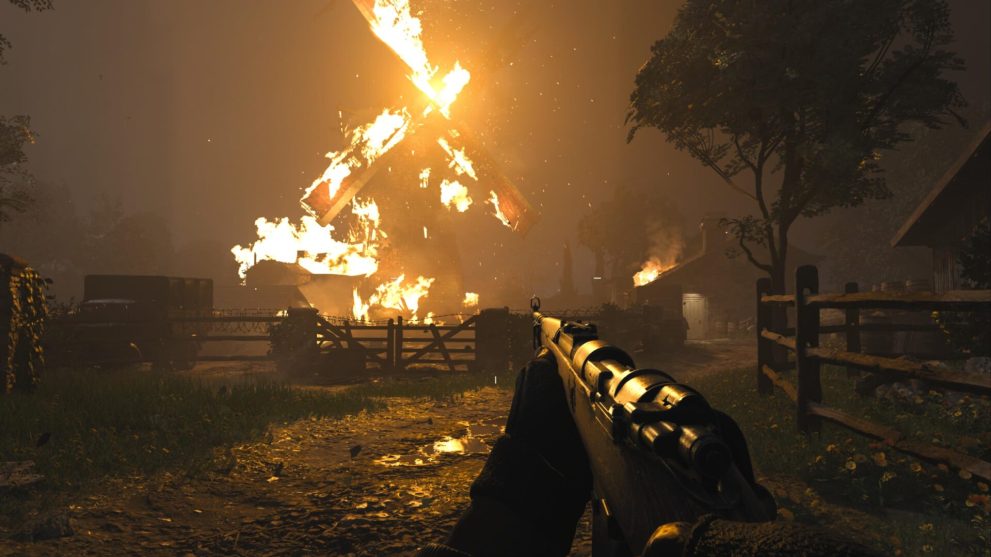
It’s also noticeably shorter than previous entries in the series, coming in at only nine missions. I think there were opportunities to add more missions with the whole team together in the ‘present’ outside of what’s already there. Similarly, Cold War’s side missions based on different ‘intel’ are absent this time around, and while these could be quite tricky and required some deduction, they were also optional allowing players to bump up the time they spent in the solo campaign if they so choose.
It’s disappointing, then, that there’s no such optional missions here. There’s an instance where one of the team has planted a bomb in the ‘present’ in order to help the team escape a sticky situation, but we’re only told of it, and not put in control of the action of this happening. This in particular feels like a missed opportunity for an optional side mission, but alas it’s not to be. All that being said, if you’re looking for more of the cinematic, explosive action that deserves to be experienced on a big TV, then Vanguard’s campaign has you covered.
While we’re on the topic of cinematic action, Vanguard’s visuals are definitely eye-catching. In one mission where I was in dense jungle, sunlight filtering through the canopy above, lush greens contrasting with the muddied browns of dirt and tree trunks, while waterfalls crashed over rocks and streams trickled through the flora and fauna covering the floor, it was difficult not to just stop and take in the view. However, I did notice random patches of the ground near me would have texture pop-in issues. I can only imagine this is down to the ‘On-demand texture streaming’ feature that the game is using, but no matter how I tweaked these settings, it didn’t resolve the issue. It’s pretty off-putting and a little disappointing to see, given the fact this is one of the biggest video game series in the world.
CoD Vanguard Multiplayer
Where a majority of players are likely spending most of their time is in Call of Duty: Vanguard’s multiplayer and right off the bat, things feel a lot better than they did in Black Ops Cold War from last year. There’re significantly more maps at launch which should help alleviate some of the repetitive strain and there’s an absolute ton of progression here, from your basic level to weapon levels, operator levels, challenges to complete, weapon skins to unlock and obviously Battle Pass levels to climb.
Finding the perfect loadout may require a little more work this time around, too, with 10 different attachment and perk slots to make use of. This also gives you a ton of flexibility in how you customize a weapon, allowing you to make a loadout that matches your playstyle, strengths and weaknesses. Of course, in order to get that perfect loadout, you’ll need to put the time in to unlock all those weapon attachments and perks, and once you begin leveling up, you fall right back into the compelling, grindy groove that the series’ multiplayer is renowned for.
Many of the 16 maps for the main multiplayer are actually pretty great, too, offering ample sightlines for snipers, tight corners and congested areas for intense close-quarters skirmishes and the typical three-lane layout that encourage confrontation rather than camping.
That being said, there are a few duds in there — we’re looking at you Sub Pen — but then there are some excellent offerings like Demyansk and Numa Numa that help balance things out, and on the whole this is probably the best selection of maps in a Call of Duty game that we’ve played for quite some time. With Shipment out in the coming weeks and another three maps due to arrive with Season One on Dec. 2, there’s plenty more in the pipeline to bolster this further, too.
There is a lack of polish in some maps, though, and while I’m sure most players won’t be spending time crawling around staring at the intricate details given the sense of urgency in the multiplayer, things like very rudimentary grass detailing was a little disappointing to spot out the corner of my eye. This wasn’t the case on every map, though, so with a bit of luck this is something that could possibly be patched out in a future update.
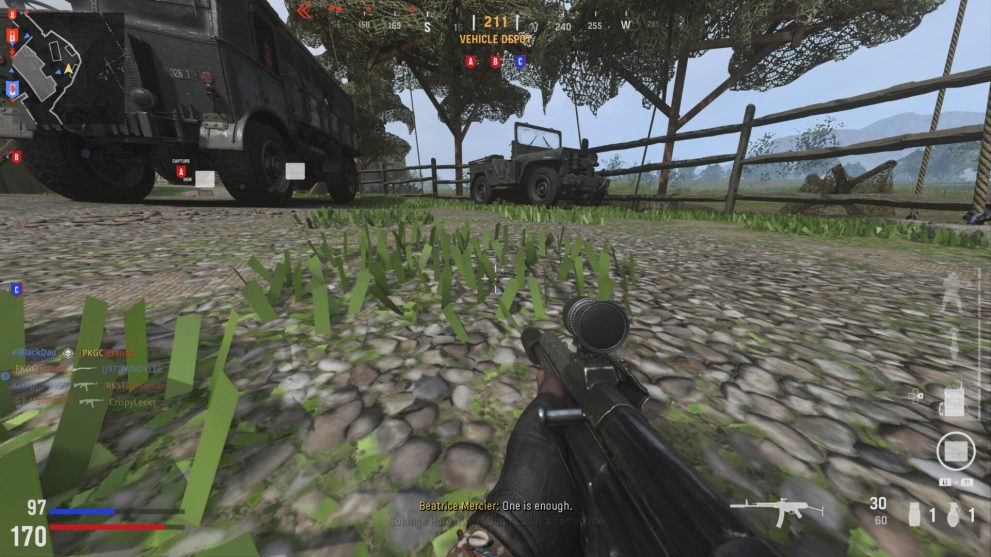
It’s not all familiar, however, as Vanguard introduces a number of new mechanics and features that are welcome additions. The Tactical Sprint, while it may sound minor adds another level to your character’s sprinting abilities, at the expanse of time to ADS. It essentially allows you to get around the map even faster, playing into Vanguard’s already fast-paced gameplay, and makes things feel more frantic and twitch-based than ever before.
That being said, Vanguard does feel a little more tactical than its immediate predecessor. Through partially destructible environments, maps can change over time, opening up new sightlines for snipers or a means of guarding an objective that wasn’t there at the beginning of the game. You need to be more aware of the changes being made to the map throughout a game or face being punished by a cheeky flank or someone picking you off from a new vantage point.
Vanguard also introduces Combat Pacing, giving you a level of control over the scale of each match you play. Tactical Pacing focuses on smaller-scale combat, Assault offers a middle ground, while Blitz goes all the way up to 20 vs 20 games. If you’re looking for non-stop action, then Blitz modes tend to be your best bet, but I did find that some maps felt like they simply weren’t designed for so many players, and it felt overly congested just about everywhere. Combined with some infuriating spawn points that place you right in front of enemies and not far enough out of the action to safely redeploy, I found myself gravitating towards the smaller Tactical and Assault Pacing modes instead.
Rounding things off in terms of new additions is Champion Hill, a rather excellent new game mode that puts players into a team of two or three and pits them against seven other teams. Each team has a set number of lives which reduces each time a member of your team is killed in a series of short 2v2/ 3v3 minute or two-long matches against another team. It’s an elimination-style mode that I could definitely see myself pouring countless hours into with friends, but playing with mic-shy strangers can be a more finnicky affair given the reliance of communication and teamwork to locate and flank enemies and overcome enemy presses effectively.
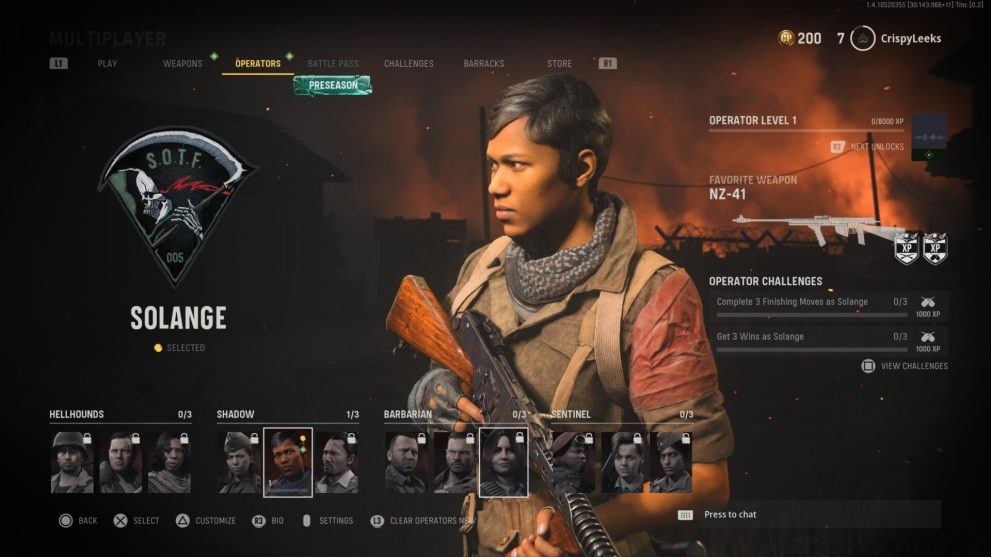
All in all, Vanguard’s multiplayer portion feels like a noticeable step-up from Cold War’s last year. The sheer number of maps and ample progression goes a long way to providing a chaotic, fast-paced FPS environment for players to burn countless hours in, and with more content on the horizon, Tactical Pacing and Champion Hill on top of the solid FPS foundations, there’s a lot to enjoy here. Spawn points are still problematic and I did find there were certainly some weapons that may require a little bit of balancing in a future patch, but it’s certainly not as problematic as Cold War at launch.
Call of Duty: Vanguard Zombies
Finally, we’ve got CoD Vanguard’s Zombies mode, and this is where things really fall apart. Vanguard adopts the ‘Outbreak’ format of Zombies that Cold War introduced a few months down the line. Rather than placing you in one area where you’ll have to survive countless waves of zombies back-to-back, Vanguard’s Zombies throws you into a Stalingrad ‘hub’ map where you can Pack-a-Punch weapons, purchase perks, and other upgrades in relative safety. There are a few zombies knocking around but they’re seldom found in groups of more than three or four.
Within Stalingrad, you’ll also find Dark Aether portals that’ll lead you to your ’rounds’ or missions. Each portal takes you to a new area through the world of Vanguard, from Nazi-occupied Paris to the Japanese army camp at Shi No Numa where you’ll be tasked with completing a different objective. One had me simply surviving the onslaught of the undead for a set time limit, while ‘Transmit’ mission types require you stay close to a golden orb as it moves around the map in order to fill up a gauge, all the while taking care of any zombie that comes your way. Complete the objective and you’re whisked back to Stalingrad for a chance to recharge and take on whatever lies through the next Portal.
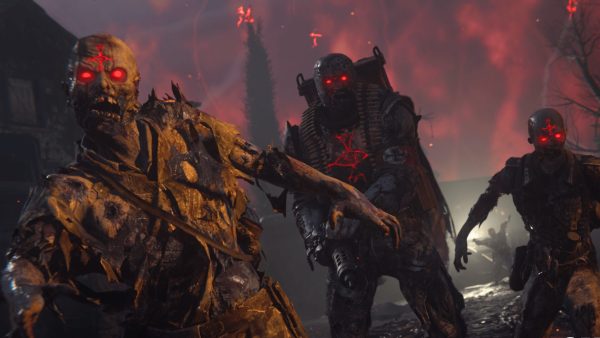
The problem with adopting the ‘Outbreak’ format through and through is that it doesn’t feel distinctly like a Call of Duty Zombies experience. While Cold War added it alongside its traditional round-based affair in an enclosed area, it’s the only option in Vanguard’s Zombies offering. Things don’t feel as intense when you know you’ve got as long as you need between rounds to perfect your loadout, and the objectives are pretty easy for quite a while when playing with a group of friends.
What’s more, there’s no main storyline in Zombies at launch, meaning there are no objectives for players to complete as they progress through the rounds, outside of the rather dull and repetitive portal objectives that make up each round.
Sure there’s the progression elements like Pack-a-Punching weapons or spending Sacrificial Hearts to give yourself newfound abilities purchased at the Altar of Covenants, but these aren’t anything to write home about. They’re a little unexciting, too safe and familiar from abilities and perks we’ve seen pop up in previous titles.
Vanguard does away with any permanent upgrades that could be kept once a game ends, too. While Black Ops Cold War used Aetherium Crystals to give each intense match more value in your long-term progression, there’s nothing of the sort here. Once you lose a game of Zombies in Vanguard, you’re back to square one. All of those Altar of Covenants abilities are gone and you’ll only level up your Operator and weapons as you do in Multiplayer — and I imagine eventually Warzone, too. It makes the grind feel a little pointless and Exfil an even more questionable inclusion, as… what’s the point of leaving early when you can just play until you die and not lose out on anything?
While I’m sure that Vanguard’s Zombies will find its own niche following, this isn’t a high point for the game mode at launch. Things can definitely change further down the line, especially with a storyline scheduled to release with Season One on Dec. 2, but right now, it’s very much something you can play once or twice and rest assured you’ve pretty much seen everything it has to offer.
Conclusion
Ultimately, Call of Duty: Vanguard is a WWII CoD game. Its short campaign offers variety in its missions, but a forgettable story you’re not going to write home about — other than perhaps that Lady Nightingale mission, seriously, it’s great. On the multiplayer side of things, things feel equally familiar. There are a few clear, standout weapons in the arsenal so far, and the ‘Pacing’ modes and bumped up number of maps at launch compared to its predecessor will certainly keep us grinding out levels for longer. Even if frustrating spawn points and some naff maps make for a turbulent experience at times. Where Vanguard should have tried to retain familiarity was with its zombies mode, but instead opted for a format that simply doesn’t capture that same intense panic and frantic experience that the core round-based, enclosed experience of previous entries does.
For those looking for more of the same, Call of Duty: Vanguard does exactly that. It’s the same, great-feeling FPS with a fresh lick of WWII paint complete with all of the weapons, locales and caveats that come with it. It’s not a revolutionary entry for the series, but it’s not a particularly poor one, either.
Pros
Cons
Multiplayer spawn points are still a little broken, often putting you right in front of enemy sightlines.
Campaign is a little short and its story can feel a little disjointed.
